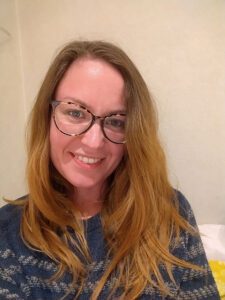 My name is Ruby. I am 38 years old, and I have focal epilepsy. I was diagnosed in Ireland at age 13 after having my second tonic-clonic seizure. Looking back, and after experiencing many more, mainly in the last five years, I believe I was having ‘smaller’ seizures before then.
My name is Ruby. I am 38 years old, and I have focal epilepsy. I was diagnosed in Ireland at age 13 after having my second tonic-clonic seizure. Looking back, and after experiencing many more, mainly in the last five years, I believe I was having ‘smaller’ seizures before then.
Being little, with no points of reference to create anxieties or fears around these experiences, which were few, I felt like they weren’t bad. I just played with them, accepting that sometimes I may find myself in another part of the room.
These sorts of experiences have interestingly been reflected in conversations I’ve had with others who’ve had similar experiences with childhood seizures. If or when my seizures choose to show, has been somewhat out of my control throughout my life.
When my seizures occur, I become reliant on those around me, regardless of their relationship to me or their ability to cope with the situation, and I often feel very isolated.
Having no predictable seizure pattern or triggers other than stress and tiredness, the times I have had reoccurring seizures have led me to live with a heightened sense of stressful anticipation as to when they may occur, making navigating my day-to-day life more difficult. I limit more normal behaviours like going to the shops or socialising.
The perceptions of others
I have found epilepsy to be, only to some extent, a hidden disability, creating a fascinating example of the dichotomy between disability and societal expectations of normalcy or ‘ability’ within an individual.
Being perceived as able, I have noticed that I am sometimes unconsciously judged by the same ideals as those around me. Few people have seen me have a seizure, so when they do, it can be somewhat jarring; also, many do not understand the impact of side effects.
Although this can require a lot of explanation and can be a bit tiring, I always prefer that people ask me questions rather than react based on uninformed ideas. This is something I have encountered in the workplace.
Vital source of information
Reading about others’ experiences of epilepsy has been a vital source of information and support for me. My experience with my second medication, levetiracetam (or Keppra), which I took for two years, is a good example of this, but not the only one. I had excellent seizure control but horrible mental health side effects with no understanding of the negative potential of Keppra or what to do if anything like that happened.
It wasn’t until my mum sent me a link to a site where people discussed their experiences of epilepsy that I was able to relate mine to theirs. Up until then, I had believed the mental health problems were mine, so I had not reached out, but the people close to me could see I was struggling.
Challenging decisions
I wanted to come off levetiracetam but found that I did not know who or how to contact my epilepsy team or even knew I had one. I had had an okay experience with epilepsy care, being relatively seizure-free. Up until then, they had contacted me, but at the time I hadn’t realised I needed them for these problems.
Questioning doctors or challenging their decisions is hard, and I certainly found it harder back then. It can be an intimidating situation where there is a lot of control over your wellbeing, and, as the patient, you feel vulnerable.
There is a lot of condition-specific knowledge that would better support the self-management of our care that gets lost because the time is not taken to collect it or the weight given to it.
Demystify epilepsy
We walk a fine line, very well, between being able and disabled very quickly when living with epilepsy. I have found that over the years, it is less my inability to cope with epilepsy itself but other people’s reactions or potential professional inaction that can be the most distressing. More needs to be done to demystify epilepsy.





